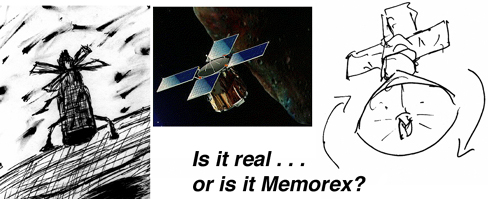 |
 |
 |

NEWS: Analysis & Commentary
Page 2
Frontloading
Is It Remote Viewing?
Continued

The research into frontloading was either done in a classified environment, or done in a non-classified setting but not published, so little is known about controlled studies in this area. According to Joe McMoneagle, very specific testing of the limits to frontloading was done at both SRI as well as SAIC in the 1980’s and 1990’s. “What was found,” McMoneagle tells us, “was an expectation for the valid response to targeting was what actually drove the success in remote viewing, far more so than an inappropriate frontloading.” What Joe means (and this is the view of others experienced in tasking operational remote viewers), is that viewers perform best when they feel there is some need for the data, that what they are doing is important. That produces better data than tasking the viewer frontloaded.
Since the research has not made it into the remote viewing community at large, it will be up to civilian remote viewing organizations to test their own theories and provide data.
One experiment was recently conducted at the Hawaii Remote Viewers’ Guild. The Hawaii guild has the largest collection of experienced viewers assembled in one location. They lead the field in publication of blind, non-frontloaded RV work.
Viewers in the guild work exclusively blind. Most viewers in the group had never even attempted a frontloaded session prior to the experiment, which was conducted with the group’s advanced and operational viewers on February 12, 2001.
The viewers were given the target ID: JBVO-PKSP. Normally they would set out to work the target with no more information than that. In this experiment the viewers were given full target disclosure. In fact they were told the actual target cue.
N.E.A.R. SPACECRAFT LANDING EVENT ON THE ASTEROID EROS, FEBRUARY 12, 2001.
The viewers were told their job was to provide sketches and data relating to the asteroid and the spacecraft. They were instructed to work the target as they would any other, following their standard structure and methodology, even though they knew the target.

At the conclusion of the session the viewers wrote about the sensations they encountered while working frontloaded. This was not a scientific, controlled experiment, rather a means of obtaining anecdotal impressions from some experienced viewers. Their impressions were uniformly negative.
One viewer said, “This felt too easy. I don’t have any confidence in the data.” Another viewer reported the data felt “counterfeit.”
In the words of yet another viewer, “frontloaded targets are too filled with preconceptions to obtain any solid data. I have no confidence in any of the work. I was constantly rejecting visuals and impressions because they failed to fit the announced target. I’m sure that all my work is contaminated and I would not submit it if choice were allowed. Frontloading is totally dishonest, no way to prove that remote viewing works.”
Just about all the viewers who worked the frontloaded target said it felt strange and uncomfortable, that they were distracted and felt “disjointed.”
What the viewers who took part in this exercise seemed to learn in their foray into frontloading, is that successful remote viewing is directly related to noise management. Working frontloaded with total target disclosure simply adds more noise to the viewer’s awareness than any human, any remote viewer should be expected to filter. It puts them in a position where they have to deal with more noise from different sources than they would normally confront in a blind target.
There is one important and sometimes overlooked reason for requiring remote viewing to be done blind. It is quite possibly the only way remote viewing will ever be accepted by the scientific community, and then by the public at large. It's a way to keep the field pure, it helps eliminate fraud, and it holds viewers to a higher standard. In addition, it gives remote viewers a base from which to judge the efficacy of their work.
Joe McMoneagle sums it up this way. “There are no good times for frontloading under any circumstances. You either remote view appropriately, or you don't.” 
 PRINT THIS ARTICLE PRINT THIS ARTICLE
Privacy Statement
Copyright © 2001, H.R.V.G.
All rights reserved.
|
 |
|
   MARCH ARTICLES
MARCH ARTICLES
·Edward Dames
Page 2
Page 3

·Frontloading
Page 2

·Ice Circle
Page 2
Sketch 1
Sketch 2
Sketch 3
Sketch 4
Sketch 5
Sketch 6
Sketch 7
Sketch 8
Sketch 9
Page 3 (RF's Session)
Sketch 1
Sketch 2
Sketch 3
Sketch 4
Sketch 5
Sketch 6
Sketch 7
Sketch 8
Sketch 9
Sketch 10
Sketch 11
Sketch 12
Sketch 13
Sketch 14
Sketch 15
Sketch 16
Sketch 17

·Discussions on RV
|


